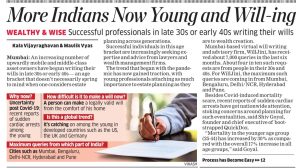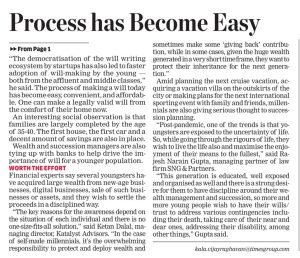Synopsis
The trend that began with the pandemic has now gained traction, with young professionals attaching as much importance to estate planning as they are to wealth creation. Mumbai-based virtual will writing and advisory firm, WillJini, has received about 7,000 queries in the last six months. About four in ten such requests are from people in their 30s and 40s.
Mumbai: An increasing number of upwardly mobile and middle-class asset owners have begun writing their wills in late 30s or early 40s – an age bracket that doesn’t necessarily spring to mind when one considers estate planning across generations.
Successful individuals in this age bracket are increasingly seeking expertise and advice from lawyers and wealth management firms. The trend that began with the pandemic has now gained traction, with young professionals attaching as much importance to estate planning as they are to wealth creation.
Mumbai-based virtual will writing and advisory firm, WillJini, has received about 7,000 queries in the last six months. About four in ten such requests are from people in their 30s and 40s.
For WillJini, the maximum such queries are coming in from Mumbai, Bengaluru, Delhi/NCR, Hyderabad and Pune. Besides Covid-induced mortality scare, recent reports of sudden cardiac arrests have got nationwide attention, stoking concerns around planning for such eventualities, said Shiv Goyal, founder and chief executive of bootstrapped QuickDox.
“Mortality in the younger age group (25-44) has increased by 30% as compared with the overall 17% increase in all age groups,” said Goyal.
“The democratisation of the will writing ecosystem by startups has also led to faster adoption of will-making by the young – both from the affluent and middle classes,” he said.
The process of making a will today has become easy, convenient, and affordable. One can make a legally valid will from the comfort of their home now.
An interesting social observation is that families are largely completed by the age of 35-40. The first house, the first car and a decent amount of savings are also in place.
Wealth and succession managers are also tying up with banks to help drive the importance of will for a younger population.
Worth the Effort
Financial experts say several youngsters have acquired large wealth from newage businesses, digital businesses, sale of such businesses or assets, and they wish to settle the proceeds in a disciplined way.
“The key reasons for the awareness depend on the situation of each individual and there is no one-size-fits-all solution,” said Ketan Dalal, managing director, Katalyst Advisors. “In the case of self-made millennials, it’s the overwhelming responsibility to protect and deploy wealth and sometimes make some ‘giving back’ contribution, while in some cases, given the huge wealth generated in a very short time frame, they want to protect their inheritance for the next generation.”
Amid planning the next cruise vacation, acquiring a vacation villa on the outskirts of the city or making plans for the next international sporting event with family and friends, millennials are also giving serious thought to succession planning.
“Post-pandemic, one of the trends is that youngsters are exposed to the uncertainty of life. So, while going through the rigors of life, they wish to live the life also and maximize the enjoyment of their means to the fullest,” said Rajesh Narain Gupta, managing partner of law firm SNG & Partners.
“This generation is educated, well exposed and organized as well and there is a strong desi- re for them to have discipline around their wealth management and succession, so more and more young people wish to have their wills/ trust to address various contingencies including their death, taking care of their near and dear ones, addressing their disability, among other things,” Gupta said.





